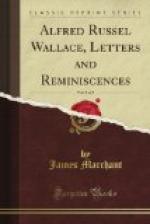Dear Sir Oliver Lodge,—Owing to ill-health and other causes I have only now been able to finish the perusal of your intensely interesting and instructive Address to the British Association. I cannot, however, refrain from writing to you to express my admiration of it, and especially of the first half of it, in which you discuss the almost infinite variety and complexity of the physical problems involved in the great principle of “continuity” in so clear a manner that outsiders like myself are able to some extent to apprehend them. I am especially pleased to find that you uphold the actual existence and continuity of the ether as scientifically established, and reject the doubts of some mathematicians as to the reality and perfect continuity of space and time as unthinkable.
The latter part of the Address is even more important, and is especially notable for your clear and positive statements as to the evidence in all life-process of a “guiding” Mind. I can hardly suppose that you can have found time to read my rather discursive and laboured volume on “The World of Life,” written mainly for the purpose of enforcing not only the proofs of a “guiding” but also of a “foreseeing” and “designing” Mind by evidence which will be thought by most men of science to be unduly strained. It is, therefore, the more interesting to me to find that you have yourself (on pp. 33-34 of your Address) used the very same form of analogical illustration as I have done (at p. 296 of “The World of Life”) under the heading of “A Physiological Allegory,” as being a very close representation of what really occurs in nature.
To conclude: your last paragraph rises to a height of grandeur and eloquence to which I cannot attain, but which excites my highest admiration.
Should you have a separate copy to spare of your Romanes Lecture at Oxford, I should be glad to have it to refer to.—Believe me yours very truly,
ALFRED R. WALLACE.
* * * * *
The last of Wallace’s letters on astronomical subjects was written to Sir Oliver Lodge about a week before his death:
TO SIR OLIVER LODGES
Old Orchard, Broadstone, Dorset. October 27, 1913.
Dear Sir Oliver Lodge,—Many thanks for your Romanes Lecture, which, owing to my ignorance of modern electrical theory and experiments, is more difficult for me than was your British Association Address.
I have been very much interested the last month by reading a book sent me from America by Mr. W.L. Webb, being “An Account of the Unparalleled Discoveries of Mr. T.J.J. See.”
Several of Mr. See’s own lectures are given, with references to his “Researches on the Evolution of the Stellar Systems,” in two large volumes.
His theory of “capture” of suns, planets, and satellites seems to me very beautifully worked out under the influence of gravitation and a resisting medium of cosmical dust—which explains the origin and motions of the moon as well as that of all the planets and satellites far better than Sir G. Darwin’s expulsion theory.




